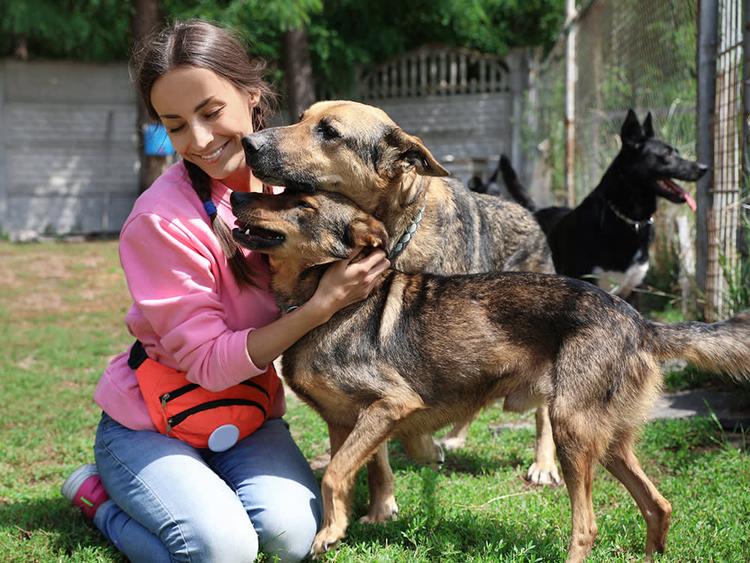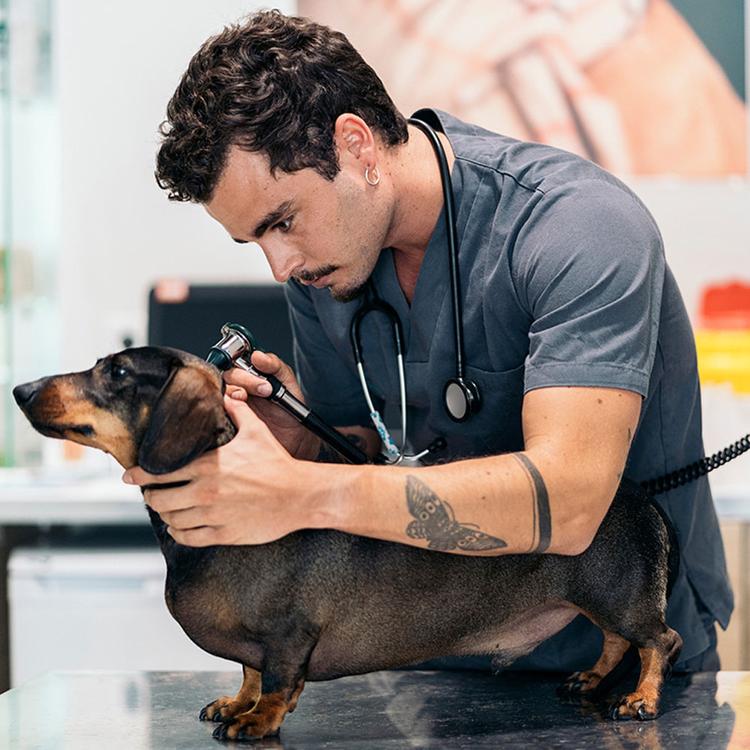by Dr. Amy Fox, DVM, | March 17, 2024

Boris Jovanovic / Stocksy
If you’re thinking about adopting a shelter pet, you may be wondering if shelter dogs are healthy. Shelter medicine has made incredible advancements, such that pets’ health problems are usually quickly identified and treated. Many veterinarians even do specialized residencies in this field to become experts in caring for shelter pets.
In this article:
Not all shelters are created equally, however, and it’s important to adopt from a reputable shelter or rescue organization. A reputable shelter is more likely to have trained staff and resources to properly care for their animals, including everything from clean, comfortable kennels, to adequate medical care, to considerations for their animals’ behavioral health and wellness. You can get a sense of these factors as you walk around a shelter. The animals there should look clean, and there should not be a bad smell in the kennels. Ideally, the animals should have beds, hiding spaces, and toys. There should be approachable staff members who can answer questions about the animals and provide you with information about their health and histories.
Read on to learn all about how shelter pets are cared for and monitored before adoption.
Adoption Q&A: How to evaluate an adoptable pet’s health
Any new pet can come into your home with a health problem or develop one shortly after you bring them home, whether they’re from a shelter, a backyard litter, or a reputable breeder. Just like people, animals can be born with certain congenital health problems, get sick from infectious agents in the environment, and/or develop health conditions over time. This is especially true of very young puppies and kittens since they don’t have all of their vaccines yet and have immature immune systems.
Different illnesses can have very different symptoms, but in general, sick animals may be quiet and lethargic and have a decreased appetite or no interest in food at all. They may also show signs such as vomiting, diarrhea, coughing, sneezing, eye or nasal discharge, limping, or areas of hair loss. Any of these signs should be checked out by a vet, as should any sudden changes in their behavior or overall health.
If an animal is displaying any of these symptoms, it does not mean they shouldn’t be considered for adoption (since they will often recover quickly with the right treatment), but you should take that into account if you have other pets at home and plan to budget for additional medical expenses.
It’s also important to keep in mind that most, if not all, animal shelters operate on very tight budgets. So the level of care they can provide to their animals may vary depending on their funding, how many animals they have at a given time, and if they are adequately staffed. All of these factors can play into how they care for the animals in their facility, and it is important to have realistic expectations of what a shelter can or cannot do. The good news is that many common conditions that pets may acquire in a shelter are easily treatable and may be easiest to treat in a home environment, where the pet is getting your undivided attention and has a more stable routine.
Here are some important questions to ask when considering a new rescue cat or dog.
What was the animal’s family history before getting to the shelter?
If an animal is surrendered to a shelter, the surrenderer is asked to fill out a detailed questionnaire regarding the pet’s behavioral and physical health and why the pet was surrendered. Sometimes, the pet is placed in a shelter because their family simply could not care for them, while other times, they may be surrendered due to a health problem or behavioral problem that the family was unable to treat.
Minimal information may be available for animals found as strays, however. The shelter may be able to tell you basic information about where they were found and any obvious health issues they had at the time of rescue, but they will not have a complete history of the animal’s past.
What is the dog’s medical history?
A well-run shelter or rescue group should be able to provide detailed information regarding the medical history of animals in their care. This should include any health problems the animal had when they arrived at the shelter and details of any illnesses that happened while they lived there. There should also be clear information on the preventative health care these animals have received while in the shelter, including vaccines, dewormings, flea treatments, spay/neuter surgeries, and/or dental procedures.
It’s also important to ask questions about the dog’s behavior, such as: “Are they active?” and “Do they have a good appetite?” This can give you a sense of their general well-being at the time of adoption.
Are there any behavioral issues?
In large animal shelters, there is often an animal behaviorist and/or trainer on the staff who tries to evaluate each animal’s temperament. Some tests are controversial, especially if they are used to evaluate an animal in a single session. This is because animals in shelters are stressed by being in a new place that may be loud and may surround them with lots of other animals. The way they behave or react to certain tests under these conditions is often not representative of how they will act in a home when they are more at ease and have consistent routines and affection.
Still, the shelter may be able to tell you if they observed specific behaviors over time, such as being aggressive towards other animals or being particularly treat-motivated. Just note that much of this information may differ from how the animal will behave in your home.
Smaller shelters or rescue groups may not have a specialized trainer on their staff, so their evaluations will be informal and more observational. They may also be able to provide information about any behavior issues the pet expressed in their previous home if they were surrendered and their former family provided that information.
Also note that at times of the year when a shelter is very crowded, such as spring and summer (when lots of kittens and puppies are born), animals may be moving in and out of the shelter very quickly. The staff may have less time to observe their behaviors and therefore have less detailed information about each animal.
Has the dog been spayed or neutered?
Most animal shelters spay and neuter the animals in their care as part of their mission. Spaying and neutering reduce the number of unwanted litters and, therefore, homeless animals who may end up in the shelter. It also decreases the risks of certain health problems related to being reproductively active. Many shelters have a policy of only adopting animals after they have been spayed or neutered. In other circumstances, shelters will require altering the pet as part of the adoption contract and expect adopters to arrange the surgery after adoption.
How are the pets kept healthy during their stay at the shelter?
Shelter staff typically put enormous efforts into keeping pets healthy. This includes taking measures to prevent infectious disease, including routine vaccinations, dewormings, flea treatments, and treating any pre-existing health problems. Shelters may routinely screen animals for common health conditions seen in strays, including ear mites, kennel cough, heartworm disease, ringworm, Feline Leukemia and FIV (for cats), and tick-borne illnesses.
If the shelter identifies these conditions, they’ll likely take precautions to isolate these animals from the healthy pets to prevent further spread of the illness and to begin treatment. Depending on the pet’s diagnosis, these animals may be placed on a hold until they have recovered, after which they will be available for adoption. If the condition is expected to be more chronic and the pet is stable, they may be adopted out to potential pet parents who are counseled on their condition and the care they will need.
Many modern shelters also have creative living spaces designed to provide pets with mental enrichment, including play spaces, music, toys, opportunities to socialize, and quiet spaces to hide and feel safe. These features are meant to reduce stress and create an environment that promotes good health.
Do shelters provide medical records to adopters?
Many animal shelters do provide medical records to adopters. For healthy pets, this may be as simple as a list of the vaccines and dewormings the pet received, as well as the dates of treatment. For animals treated for more complicated health problems, there may be more lengthy medical records that include test results and the details of treatments such as medications or surgeries. Some shelters work closely with specialty veterinarians and may send an animal for evaluation and/or treatment at a specialized hospital if the shelter cannot provide all of the care on-site and if they have the budget to do so.
What happens if a pet has a health issue at the shelter?
Most animal shelters have trained medical staff, including nurses and veterinarians, who routinely screen all the animals for signs of illness and are available to evaluate any animal that seems ill. Many shelters have a medical treatment area that includes a variety of diagnostic equipment and medications. Some are very high-tech and may have everything from X-ray machines to operating rooms on-site, while others may have only basic facilities.
The first step in all cases where a sick animal is identified will be for a veterinarian to perform a full physical exam. Based on those findings, additional tests may be needed to make a diagnosis. Most routine infections and simple ailments can be treated at the shelter. The pet may be placed in a medical or isolation ward if the condition is contagious, and they may be on an adoption hold until they recover.
Animals with more serious conditions may need to be transferred to a specialized veterinary hospital for more intensive care, if there is one nearby and if the shelter has the budget for this level of care. In extreme cases, an animal who has a very poor prognosis for recovery or who is suffering despite the best care available may be humanely euthanized.
Are shelter pets tested for diseases?
Shelter pets are typically screened for infectious diseases known to occur in strays, and shelters work very hard to contain disease outbreaks and keep the overall population healthy. Not every shelter has the budget to run multiple tests routinely, so they may treat animals for the most likely diagnosis based on physical exam findings alone. It may be a better use of a shelter’s limited funds to use that money for treatment instead of lots of tests.
What diseases are shelter pets tested for?
Shelter pets are mostly screened for infectious diseases, since these may pose a risk to other animals in the shelter and to themselves. For dogs, this may include heartworm and tick-borne illnesses. Cats are often tested for Feline Leukemia and FIV. Animals showing symptoms of other common conditions may also be tested for diseases such as intestinal parasites, ringworms, or skin mites. Sick or injured pets may have more tests performed, including bloodwork and/or X-rays, depending on their symptoms.
Are pets for adoption at shelters and rescues healthy?
Pets adopted from trusted shelters and rescues often are very healthy, and you can look for signs of good health, including bright, clear eyes and a full, shiny coat, as well as lots of energy and a good weight.
Most organizations employ trained medical personnel to evaluate each animal upon arrival and perform routine screenings on all animals in their care. Sick animals receive appropriate diagnostics and treatment for their ailments. Furthermore, most shelters keep animals current on their vaccinations, routine dewormings, flea and tick preventatives, and often spay or neuter pets before adoption.
Like any new pet, however, animals from shelters can become sick in your care. Whether it is due to an infection, injury, or congenital problem, their signs may not have been evident in the shelter, especially if they were only there for a very short time. It is always important to have any new pet evaluated by your veterinarian and to monitor them closely for signs of illness as they settle in.
How can I minimize the chances that my newly adopted pet will be, or will get, sick?
The best way to prevent your pet from getting sick is through routine preventative care, as recommended by your vet. Once you decide to adopt a pet, make an appointment with a veterinarian to get established as a new patient, have a thorough exam, and discuss any additional preventative health measures your pet needs to stay healthy, including vaccines, dental work, and/or spaying or neutering if that was not already done at the shelter.
It is also very important to provide your pet with a consistent routine, good nutrition, and plenty of exercise and mental enrichment. Not every illness can be prevented, but you can sometimes take steps that can help. For example, brushing your pet’s teeth can slow the process of dental disease. You’ll also want to familiarize yourself with conditions associated with your animal’s breed, even if your pet is a mix.
Be sure to take your pet to the veterinarian at least once a year for routine exams (or more frequently, if advised), and make sure they receive the proper vaccinations and health screenings that your veterinarian recommends. You should also see your vet as soon as you notice something is amiss to prevent your pet from getting sicker.
Commonly asked questions
How do shelters ensure the health of the pets up for adoption?
Shelter staff take measures to screen for and prevent infectious diseases, treat pre-existing health problems, and address animals’ behavioral health.
How are the pets kept healthy during their stay at the shelter?
They’re routinely screened for signs of illness and treated with preventative health measures. Sick animals are isolated to control the spread of infectious diseases.
Are shelter pets tested for diseases?
Shelter pets are mostly screened for infectious diseases that pose a risk to themselves and other animals, including heartworm, tick-borne illnesses, and FIV for cats.
What happens if a pet has a health issue at the shelter?
Most animal shelters have medical staff who evaluate sick animals and either treat them at the shelter or transfer them to a specialized veterinary hospital.
Do shelters provide medical records to adopters?
Yes, most animal shelters provide medical records to adopters.
References
Behavioral Assessment in Animal Shelters
The Guidelines for Standards of Care in Animal Shelters
People, Pets, and Policies: Towards Community Supported Animal Sheltering

Dr. Amy Fox, DVM
Amy Fox, DVM is a small animal veterinarian in New York City. She has worked in many different settings including shelter medicine, emergency medicine, general practice, and animal cruelty and forensics. She is especially interested in nutrition, preventative medicine and care for senior pets. Dr. Fox also enjoys writing about veterinary medicine and teaching. In her free time she loves to cook, garden, and go for long runs.
Related articles

Adoption Advice
12 Science-Backed Reasons Dogs Make the Best Pets

Adoption Advice
The 3-3-3 Rule For Dogs: Adopted Dog Adjustment Period Explained

Adoption Advice
How to Choose a Vet for My Dog?

Adoption Advice
Vet Bill Assistance: Get Help with Vet Bills
Dealing with high vet bills? See assistance options for affordable pet care. Get the support your pet needs without breaking the bank.

Shelters & Rescue
Pet Shelter Myths: Facts About Adopting from a Shelter
Debunk a few animal shelter myths and learn the benefits of adopting from a shelter or rescue group.

Adoption Advice
5 Tips to Make Pet Costs More Affordable
Is the responsibility of taking care of your pet causing you to worry about your budget? Rest assured, there are a number of ways to minimize this financial stress.

Adoption Advice
Cat vs. Dog: Which Pet is Best for Me?
Considering getting a pet but unsure if you want a cat or dog? Here are 10 differences to consider.

Adoption Advice
How to Adopt a Therapy Dog
Interested in adopting a therapy dog? Read more to learn about the adoption process and what to expect.

Adoption Advice
Puppy’s First Vet Visit: What To Expect
Wondering what to expect from your puppy’s first vet visit? Read more to learn about how to prepare and what to expect.